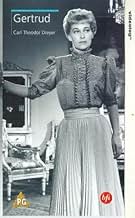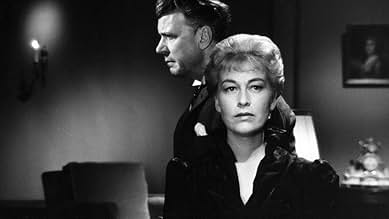IMDb-BEWERTUNG
7,3/10
6991
IHRE BEWERTUNG
Füge eine Handlung in deiner Sprache hinzuIn the elegant world of artists and musicians, Gertrud ends her marriage to Gustav and takes a lover, the composer Erland Jansson.In the elegant world of artists and musicians, Gertrud ends her marriage to Gustav and takes a lover, the composer Erland Jansson.In the elegant world of artists and musicians, Gertrud ends her marriage to Gustav and takes a lover, the composer Erland Jansson.
- Auszeichnungen
- 3 Gewinne & 1 Nominierung insgesamt
Edouard Mielche
- The Rector Magnificus
- (as Edouard Mielché)
Handlung
WUSSTEST DU SCHON:
- WissenswertesOne of Lars von Trier's favorite films.
- PatzerWhen Gertrud walks across the room in order to give Axel his letters back, the shadow from the camera and equipment can clearly be seen on the back wall.
- Zitate
Gertrud Kanning: There's no happiness in love. Love is suffering. Love is unhappiness.
- VerbindungenEdited into Eventyret om dansk film 15: Fjernsyn og biografkrise - 1961-1965 (1996)
Ausgewählte Rezension
When Gertrud was first released in 1964, the critics weren't kind to it (one can still see on Rotten Tomatoes the Time magazine review, who said "more museum piece than masterpiece"). Seeing Gertrud some fifty years after its initial release - Carl Dreyer's last film by the way, and one wonders if he knew it would be the last - I can understand why: this is very, very understated filmmaking and acting. It's a romance film but much more about loss than about real love... or, I should amend that, it IS about love, and really how impossible it is to hold on to, or to find in the first place, as Gertrud is married to one man (soon to be a Cabinet Minister, oh boy) who she may have never loved in the first place, pines after a younger man who sees it as a fling and is startled to hear there is more on her mind, and one more man, an old friend and respected artist, who has been affectionate to her for years and... then what happened?
Why I understand is this: at the time this was made, and even more-so today, people want to see some PASSION (in capital letters) when it comes to their stories of love, or at least some sense of energy to the filmmaking - Truffaut and Godard exemplified these two sensibilities in their stories of love and loss in the Nouvelle Vague. Dreyer is much more experimental; characters only every once in a while will even *look* at one another in a scene as they talk - and you'll find out if you watch, there is a lot of talking, it's based on a play and it feels every moment of it. This is highly unusual just from an acting standpoint, as in acting the performers will most often look at each other and so that you can't see any of the fakery of their acting or see the "acting" in quotes - when they're looking one another in the eye, it's harder to deceive.
So why watch it? It's certainly not exactly a "fun" time at the movies, but that doesn't mean anything - so many movies out there bring with it the expectation that you'll get some kind of emotional or intellectual catharsis or consciousness-expansion out of it (Dreyer's previous Passion of Joan of Arc and Day of Wrath are hard to watch at times, but the thrill of filmmaking is there in spades). Getrud asks for your patience and asks you to meet it halfway; if you do, you'll discover a world of hurt that these actors are conveying in their characters. This is, after all, the world of the upper class that we're seeing as Gertrud is in this loveless marriage, and yet even leaving is such a difficult task - women so rarely left their husbands then that's how you got plays that were so groundbreaking as A Doll;s House - so you have to look deeper to see what's there.
The takes on these actors last quite a while as well; why have unnecessary cuts when a long take will do just fine? It's easy to see people feeling antsy watching it, and it's a difficult film to defend in the sense of 'Well, the movie's really entertaining, it is!' It's not an easy sit. But, this was something that, frankly, I started to watch late at night thinking that it might actually help me go to sleep - not that I was out against the film already, but I could watch a little, fall asleep, and watch it again the next day.
It actually kept my attention and I fought against nodding off. It is about something and people who are pining for something that either was long ago there and no longer is, or was never there to begin with and memories have been created to fill in the gaps, as the husband does with his wife. It's also about how men look at a woman such as Gertrud, and as stubborn as she may be there is more complexity to her thinking and how her view of love and dependency changes. By the end, as an older woman, looking back at a poem written as a teenager, there's both hope and real sadness for what has been gone and what will be forever gone in death. And for as little as seems to be happening with the cuts or those precious moments where characters look at one another (or, for that matter, those gulfs of time spent looking off into nothingness, trying to find something to fill the void in themselves), everything that does happen matters.
Ultimately, Dreyer made a film where we have to see these people. We either can or we won't, but there's little to help along the way. It's bold and provocative, if not something to put on at a dinner party.
Why I understand is this: at the time this was made, and even more-so today, people want to see some PASSION (in capital letters) when it comes to their stories of love, or at least some sense of energy to the filmmaking - Truffaut and Godard exemplified these two sensibilities in their stories of love and loss in the Nouvelle Vague. Dreyer is much more experimental; characters only every once in a while will even *look* at one another in a scene as they talk - and you'll find out if you watch, there is a lot of talking, it's based on a play and it feels every moment of it. This is highly unusual just from an acting standpoint, as in acting the performers will most often look at each other and so that you can't see any of the fakery of their acting or see the "acting" in quotes - when they're looking one another in the eye, it's harder to deceive.
So why watch it? It's certainly not exactly a "fun" time at the movies, but that doesn't mean anything - so many movies out there bring with it the expectation that you'll get some kind of emotional or intellectual catharsis or consciousness-expansion out of it (Dreyer's previous Passion of Joan of Arc and Day of Wrath are hard to watch at times, but the thrill of filmmaking is there in spades). Getrud asks for your patience and asks you to meet it halfway; if you do, you'll discover a world of hurt that these actors are conveying in their characters. This is, after all, the world of the upper class that we're seeing as Gertrud is in this loveless marriage, and yet even leaving is such a difficult task - women so rarely left their husbands then that's how you got plays that were so groundbreaking as A Doll;s House - so you have to look deeper to see what's there.
The takes on these actors last quite a while as well; why have unnecessary cuts when a long take will do just fine? It's easy to see people feeling antsy watching it, and it's a difficult film to defend in the sense of 'Well, the movie's really entertaining, it is!' It's not an easy sit. But, this was something that, frankly, I started to watch late at night thinking that it might actually help me go to sleep - not that I was out against the film already, but I could watch a little, fall asleep, and watch it again the next day.
It actually kept my attention and I fought against nodding off. It is about something and people who are pining for something that either was long ago there and no longer is, or was never there to begin with and memories have been created to fill in the gaps, as the husband does with his wife. It's also about how men look at a woman such as Gertrud, and as stubborn as she may be there is more complexity to her thinking and how her view of love and dependency changes. By the end, as an older woman, looking back at a poem written as a teenager, there's both hope and real sadness for what has been gone and what will be forever gone in death. And for as little as seems to be happening with the cuts or those precious moments where characters look at one another (or, for that matter, those gulfs of time spent looking off into nothingness, trying to find something to fill the void in themselves), everything that does happen matters.
Ultimately, Dreyer made a film where we have to see these people. We either can or we won't, but there's little to help along the way. It's bold and provocative, if not something to put on at a dinner party.
- Quinoa1984
- 5. Juli 2015
- Permalink
Top-Auswahl
Melde dich zum Bewerten an und greife auf die Watchlist für personalisierte Empfehlungen zu.
- How long is Gertrud?Powered by Alexa
Details
- Laufzeit1 Stunde 56 Minuten
- Farbe
- Sound-Mix
- Seitenverhältnis
- 1.66 : 1
Zu dieser Seite beitragen
Bearbeitung vorschlagen oder fehlenden Inhalt hinzufügen





















